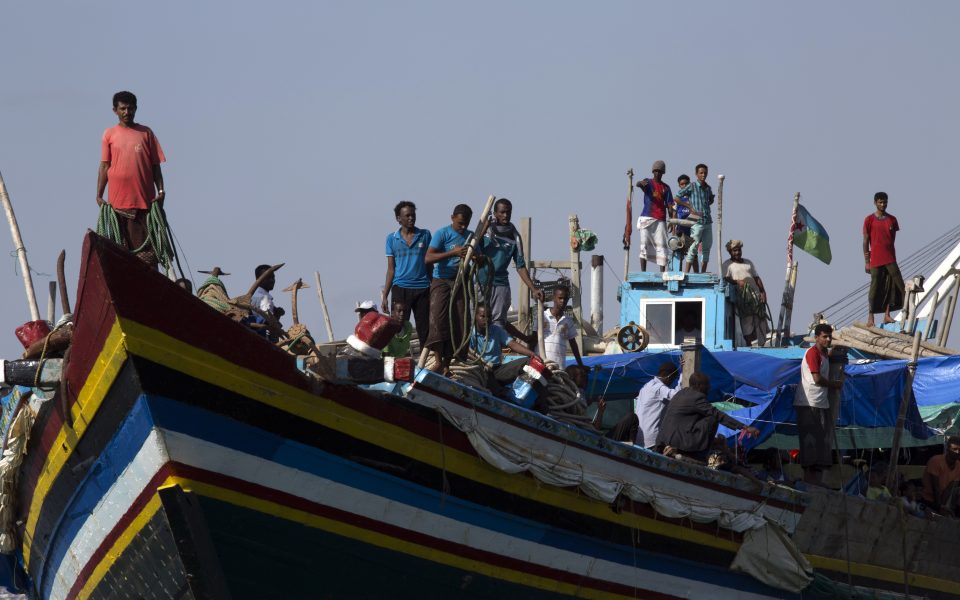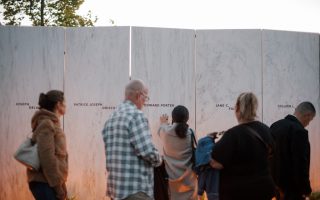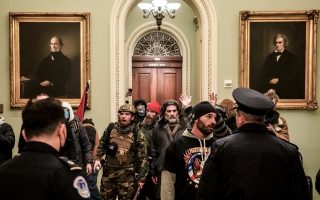20 Years On, the war on terror grinds along with no end in sight

When President Joe Biden told an exhausted nation on Aug. 31 that the last C-17 cargo plane had left Taliban-controlled Kabul, ending two decades of American military misadventure in Afghanistan, he defended the frantic, bloodstained exit with a simple statement: “I was not going to extend this forever war.”
And yet the war grinds on.
As Biden drew the curtain on Afghanistan, the CIA was quietly expanding a secret base deep in the Sahara, from which it runs drone flights to monitor al-Qaida and Islamic State group militants in Libya, as well as extremists in Niger, Chad and Mali. The military’s Africa Command resumed drone strikes against the Shabab, an al-Qaida-linked group in Somalia. The Pentagon is weighing whether to send dozens of Special Forces trainers back to Somalia to help local troops fight militants.
Even in Kabul itself, a fiery drone strike on men believed to be Islamic State plotters targeting the airport portended a future of military operations there. The attack, which the Pentagon called a “righteous strike” to avert another deadly suicide bombing, showcased America’s “over-the-horizon” capabilities, to use a phrase favored by Biden. Family members denied that the men being targeted were militants and said the strike killed 10 people, seven of them children.
Twenty years after 9/11, the so-called war on terror shows no sign of winding down. It waxes and wanes, largely in the shadows and out of the headlines — less an epochal clash than a low-grade condition, one that flares up occasionally, as in 2017, when Islamic State group militants ambushed American and local soldiers outside a village in Niger, killing four Americans.
Taking stock of this war is difficult because it is inseparable from the twin calamities of Afghanistan and Iraq. In those countries, the United States reached beyond the tactics of counterterrorism for a more ambitious, ill-fated project to remake fractured, tribal societies into American-style democracies.
Those failures are etched in the shameful images of prisoners at Abu Ghraib in Iraq or of desperate Afghans falling from the belly of an American plane. They are documented in the deaths of more than 7,000 American service members, hundreds of thousands of civilians and trillions of squandered American dollars.
The counterterrorism war, much of it waged covertly, defies such metrics. More and more of it involves partners. Large parts of it occur in distant places such as the Sahel or the Horn of Africa. American casualties, for the most part, are limited. And success is measured not by capturing a capital or destroying an enemy’s army, but by breaking up groups before they have a chance to strike the American homeland or overseas assets such as embassies and military bases.
By that yardstick, say counterterrorism experts, the war on terror has been an undisputed success.
“If you had said on 9/12 that we’d have only 100 people killed by jihadi terrorism and only one foreign terrorist attack in the United States over the next 20 years, you’d have been laughed out of the room,” said Daniel Benjamin, the State Department’s coordinator for counterterrorism in the Obama administration.
“The fact that it had to be accompanied by two wars makes it hard for people to disaggregate how successful counterterrorism policies have been,” said Benjamin, now president of the American Academy in Berlin.
There are other explanations for the lack of a major foreign attack: tighter border security and the ubiquity of the internet, which has made it easier to track and disrupt jihadi movements; or the upheavals of the Arab Spring, which shifted the sights of extremists to their own societies.
Nor is it accurate to say that the West has been shielded from the scourge of terrorism. The 2004 Madrid train bombing; the 2005 London bus and subway bombings; and the 2015 attacks on a nightclub and stadium in Paris — all bore the hallmarks of the kind of well-organized attack that brought fire and death to lower Manhattan and the Pentagon.
“The war on terror can only be assessed as relatively successful inside the Western world, more within the United States than with respect to Western Europe as a whole,” said Fernando Reinares, director of the Program on Violent Radicalization and Global Terrorism at the Elcano Royal Institute in Madrid.
Still, in comparison to the comprehensive failures in Iraq and Afghanistan, the “other” war on terror has so far achieved its bedrock goal of protecting the United States from another 9/11-type attack.
The question is: At what cost?
The abuses and excesses of war — from torture to remote-control killing by drone — have cost the United States moral authority around the world. Its occupying armies spawned a new generation of al-Qaida franchises, while the black-clad fighters of the Islamic State group swarmed into the vacuum left by departing U.S. troops in Iraq. And the financial drain from a sprawling counterterrorism campaign has been vast, fueling the military’s budgets even years after major combat in Afghanistan and Iraq ended.
Will the United States be able to sustain this colossal expense in an era where Biden is trying to recalibrate American foreign policy to tackle new challenges, such as climate change, pandemics and the great-power rivalry with China?
A New Kind of Warfare
Few presidents offered a more succinct description of this new kind of warfare than Barack Obama, speaking to the cadet graduates at the U.S. Military Academy in 2014. The graduates, he said, would no longer be called on to serve in misbegotten wars, but they would have to confront a spider web of terrorist threats from Middle East to Africa.
“We have to develop a strategy that matches this diffuse threat; one that expands our reach without sending forces that stretch our military too thin, or stirs up local resentments,” Obama declared to a subdued audience on a chilly morning. “We need partners to fight terrorists alongside us.”
He listed Syria, Yemen, Somalia and Libya, where the United States was either training local troops, supplying weapons or carrying out drone strikes. He did not mention Pakistan, where he oversaw an escalation of CIA drone strikes despite anguishing over their lack of public accountability.
Even this catalog of conflicts failed to capture the octopuslike reach of U.S. operations, which expanded further under his successor, Donald Trump. Between 2018 and 2020, the United States was engaged in some form of counterterrorism activity in 85 countries, according to the Costs of War Project at Brown University.
American forces were involved in combat, either directly or through proxies, in 12 countries, including Iraq, Kenya, Mali, Nigeria, Somalia, Syria, Yemen and Afghanistan. The United States has had the legal authority to conduct special operations in Cameroon, Libya, Niger and Tunisia. It carried out air or drone strikes in seven countries: Afghanistan, Iraq, Libya, Pakistan, Somalia, Syria and Yemen.
U.S. troops have conducted counterterrorism training exercises in 41 countries. And the United States has trained the military, police or border forces of close to 80 countries, according to Stephanie Savell, co-director of the project, at Brown’s Watson Institute for International and Public Affairs.
While the pace of some activities slowed during the pandemic, she said, “Biden is doubling down on these far-flung operations.”
The melting away of the American-trained Afghan army in the face of the Taliban’s advance has cast a shadow over the concept of working with local partners, as did the wholesale retreat of Iraqi troops from Islamic State fighters, who briefly succeeded in establishing a caliphate over much of Iraq and Syria in 2014 and organized terror networks in Europe.
But there are other examples where the United States, with more realistic ambitions and limited goals, has been able to forge fruitful partnerships with local militias. Syrian Kurdish fighters, aided by U.S. troops, evicted the Islamic State group from Syria, while Libyan militias, helped by U.S. airstrikes, uprooted Islamic State fighters from their base in the Libyan city of Sirte.
“These were urban strongholds where you had militants planning strikes against the U.S.,” said Kim Cragin, a senior research fellow in counterterrorism at the National Defense University. “And these were not 20-year missions; more like six-month missions.”
Between law enforcement cooperation, military training and the sharing of intelligence, the war on terror has been one of the better examples of multilateralism in recent decades. Unlike, say, the economic competition with China, the United States and its allies have stayed remarkably in sync about the imperative of fighting terrorism since the week after 9/11, when NATO invoked Article 5, the principle of collective self-defense, for the first and only time in its history.
“One of the biggest successes in the war on terror is the one we take the most for granted — the close bonds with our allies,” said Bruce Hoffman, a counterterrorism expert at Georgetown University. “We could always count on being on the same page with them on counterterrorism.”
How America’s chaotic departure from Afghanistan will affect those relationships is anybody’s guess. Hoffman said he worried that the Biden administration’s perceived lack of consultation with European allies, which has angered political leaders, would filter down into the intelligence ranks.
For all the efforts to portray the U.S. mission as humane and morally just, the long years of bloodshed disillusioned allies and hardened adversaries. Some American operations, such as those in the West African country of Burkina Faso, not only failed to stamp out extremism but may have inadvertently worsened it.
The flip side of collaboration is that the United States lashed itself to unsavory players, from Saudi Arabia, with its heavy-handed intervention in Yemen, to Egypt, which has carried out a brutal crackdown on its domestic opponents in the name of fighting extremism.
At home, the political consensus that undergirded the war on terror is fracturing, a casualty of America’s extreme polarization. Some Republicans called for Biden to be impeached after the suicide attack at Kabul’s airport that killed 13 service members — something that would have been impossible to imagine happening to George W. Bush after 9/11.
Trump and former aides, like Secretary of State Mike Pompeo, have been scathing in their criticism of Biden, never mind that they negotiated the deal with the Taliban that pressured the Afghan government to release 5,000 prisoners of war and set the clock ticking for the U.S. withdrawal in 2021.
“Counterterrorism was always a bipartisan issue,” Hoffman said. “But both major parties now have deep internal divisions over it. Leaders are playing to the constituency that they believe is the strongest.”
Biden’s Shifting Positions
Biden was present at the creation of the war on terror. In January 2002, weeks after the United States ousted the Taliban, he became the highest-ranking American politician to visit the battlefield. After touring a bombed-out Kabul, he said the United States should take part in a multinational military force to restore order.
“I’m talking about a multilateral force with orders to shoot to kill,” said Biden, who was then chair of the Senate Foreign Relations Committee. “Absent that, I don’t see any hope for this country.”
In the ensuing years, Biden became disenchanted with the corruption of its pro-Western leaders and skeptical that the United States could ever unify its warring tribes. He became the administration’s leading naysayer on the use of military force, opposing the troop surge in Afghanistan and the NATO intervention in Libya, and even advising against the commando raid that killed Osama bin Laden.
Now, having fulfilled his promise to leave Afghanistan, it falls to Biden to articulate the next chapter of the war on terror to a country that has tired of the subject. Americans are far more preoccupied with the coronavirus or the wildfires and flash floods that are a byproduct of climate change.
“My biggest concern is that the FDA has not approved vaccines for kids under 12,” said Cragin, referring to the U.S. Food and Drug Administration. “The fact that my mom’s biggest concern when she goes to a movie theater is not a terrorist attack is a good thing.”
Biden has indicated he is open to updating one of the relics of the post-9/11 period: the 2001 law that authorized the president to wage war on those responsible for the attacks. It has been stretched beyond recognition to justify military action against all sorts of new enemies. Biden has also imposed limits on drone strikes and commando operations, pending a review.
The president’s matter-of-fact language is not unlike that of his old boss, Obama. He speaks of diffuse threats from al-Shabab in Somalia; al-Qaida affiliates in Syria and Yemen; and Islamic State spinoffs in Africa and Asia. America’s “over-the-horizon” capabilities, he said, would enable it “to strike terrorists and targets without American boots on the ground — or very few, if needed.”
It is a stark contrast to Bush, who coined the phrase “global war on terror.” In the feverish aftermath of 9/11, he framed the battle in Manichaean terms, not just as a law enforcement or counterterrorism challenge, but as a twilight struggle between good and evil.
“Why do they hate us?” Bush asked a joint session of Congress. “They hate what they see right here in this chamber: a democratically elected government. Their leaders are self-appointed. They hate our freedoms: our freedom of religion, our freedom of speech, our freedom to vote and assemble.”
As the war on terror enters its third decade — some have taken to calling it the post-post-9/11 era — American presidents no longer cast the battle in existential terms. The defining contest of 2021, Biden has said, is between open societies and the autocrats in Moscow and Beijing.
The question is whether a divided, distracted United States will have the resources or patience to maintain an effective counterterrorism policy. The White House still has not appointed a counterterrorism coordinator in the State Department, an important post for an administration keen on nonmilitary solutions.
If the war on terror helped prevent another deadly foreign attack on American soil, it utterly failed to prevent the proliferation of terrorist groups. With the triumph of the Taliban, these new fighters have fresh inspiration to fix their sights on a familiar target.
“People always say, ‘We can’t have another 9/11 because our security is so much better,’” Hoffman said. “But terrorists are the ultimate opportunists. They’re always looking for opportunities.”
[This article originally appeared in The New York Times.]






